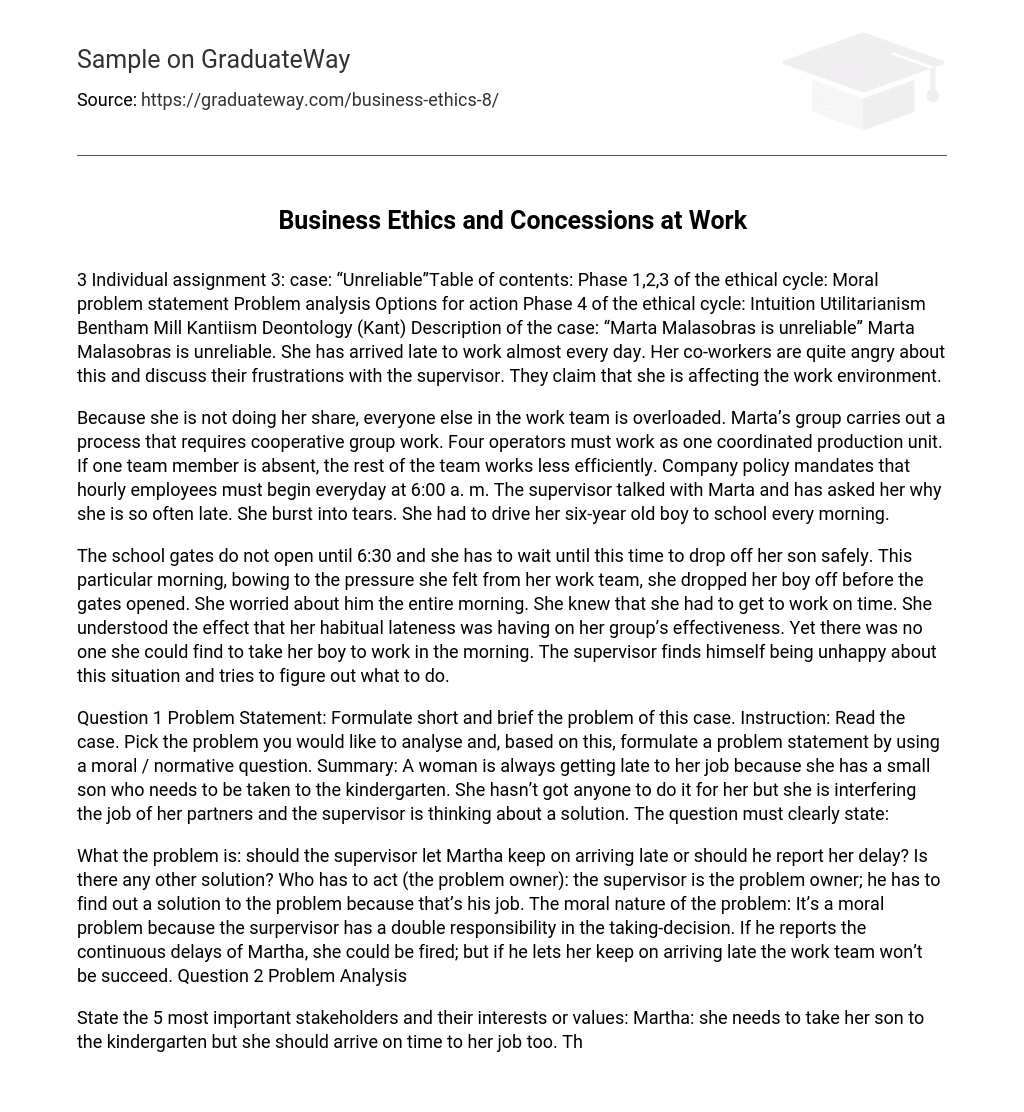Problem analysis
Options for action Phase 4 of the ethical cycle: Intuition Utilitarianism Bentham Mill Kantiism Deontology (Kant) Description of the case: “Marta Malasobras is unreliable” Marta Malasobras is unreliable. She has arrived late to work almost every day. Her co-workers are quite angry about this and discuss their frustrations with the supervisor. They claim that she is affecting the work environment.
Because she is not doing her share, everyone else in the work team is overloaded. Marta’s group carries out a process that requires cooperative group work. Four operators must work as one coordinated production unit. If one team member is absent, the rest of the team works less efficiently. Company policy mandates that hourly employees must begin everyday at 6:00 a. m. The supervisor talked with Marta and has asked her why she is so often late. She burst into tears. She had to drive her six-year old boy to school every morning.
The school gates do not open until 6:30 and she has to wait until this time to drop off her son safely. This particular morning, bowing to the pressure she felt from her work team, she dropped her boy off before the gates opened. She worried about him the entire morning. She knew that she had to get to work on time. She understood the effect that her habitual lateness was having on her group’s effectiveness. Yet there was no one she could find to take her boy to work in the morning. The supervisor finds himself being unhappy about this situation and tries to figure out what to do.
Question 1 Problem Statement
Formulate short and brief the problem of this case.
Instruction: Read the case. Pick the problem you would like to analyse and, based on this, formulate a problem statement by using a moral / normative question. Summary: A woman is always getting late to her job because she has a small son who needs to be taken to the kindergarten. She hasn’t got anyone to do it for her but she is interfering the job of her partners and the supervisor is thinking about a solution. The question must clearly state:
What the problem is: should the supervisor let Martha keep on arriving late or should he report her delay? Is there any other solution? Who has to act (the problem owner): the supervisor is the problem owner; he has to find out a solution to the problem because that’s his job. The moral nature of the problem: It’s a moral problem because the surpervisor has a double responsibility in the taking-decision. If he reports the continuous delays of Martha, she could be fired; but if he lets her keep on arriving late the work team won’t be succeed.
Question 2 Problem Analysis
State the 5 most important stakeholders and their interests or values:
- Martha: she needs to take her son to the kindergarten but she should arrive on time to her job too.
- The supervisor: his job is to take care of the good progress of the work in the company.
- The team-work: everybody is working hard unless Martha, and she breaks the dynamic.
- The company: the company needs to keep a control of the employees; they must work together as a team to reach achievements so as the company can be successful.
- Martha’s son: he needs to be taken to the kindergarten every morning.
Which interests conflict with each other? Martha and her son are in conflict with the team-work and the company because they needs her on time to work correctly but she can’t leave her son at school earlier than 06:30 and is too small to stay there waiting alone. The supervisor is in the middle of the problem. State the relevant facts and the uncertain or possible missing facts you need to solve this problem. (you may make assumptions): Has the boy a father? In that case he should bring his son to the kindergarten. Does Martha’s partners work really as hard as her even when she arrives late?
Did Martha has a maternity permission? Is possible to make the team-work at any other hour?
Question 3 Options for action
The problem owner of your choice has several options in this case. Make a list of actions out of which he could choose. State three different options: To report the continuous delays of Martha Not to say anything Propose a change in the schedule of work
Question 4 Ethical evaluation
Intuition Based on your intuition, what would you do? In this situation I’m more inclined to try to find a solution in which Martha can keep on carrying her son to the school. I would propose to change the hour of the work in team so as she keep on working as much as her partners but she is able to take care of her son too.
Question 5 Reflection
What would you do after your ethical evaluation? I’ll try to change the schedule of the team work or to discuss any other alternative which lets Martha to keep on being a good mother and work correctly. What makes it difficult for you to make this choice? It’s a bigger effort to think about alternatives than to fire the person who gives problems, for example. What conflicts do you feel or could you create following this decision?
Maybe the members of the team don’t want to meet at any other hour. What do you like about Kant’s ethics of principles? He thinks also about the intention, not only quantifiable goals. With a good attitude it’s easier to find out a good solution for the most of people involved in a problem, so that’s a good point of view. What criticism do you have on Kant’s ethics of principle? It’s not possible to put off cultural prejudices so, even when there are some universal thoughts it’s almost impossible to know which way of thinking is the completely right or wrong.





